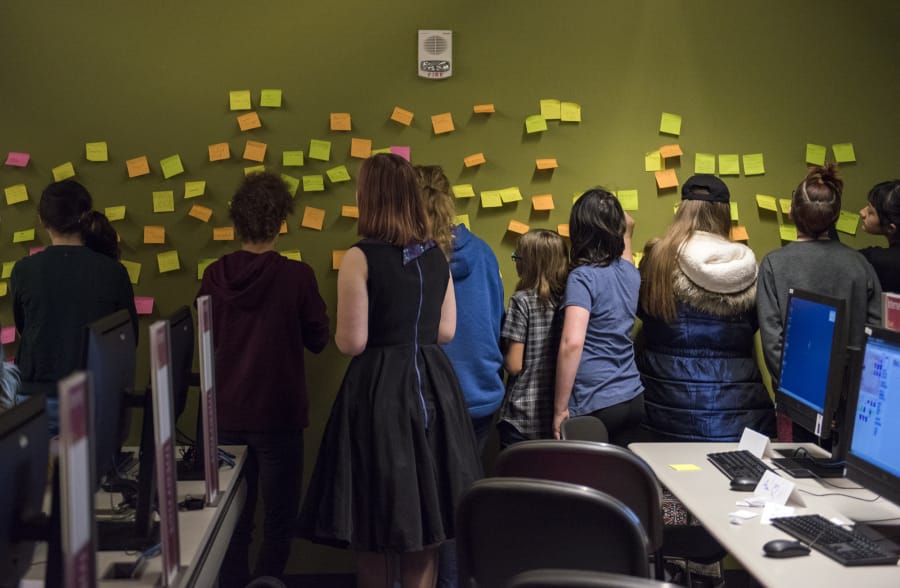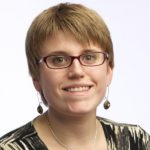It’s evening at the Vancouver Community Library, and one wall of the computer classroom is laden with sticky notes.
Some feature ideas for websites that would teach girls how to code. Others, video games featuring female characters. Some just have the names of television shows, movies or concepts. “Escape room.” “Bob’s Burgers.” “Murder mystery.”
It’s that last one that piques the room’s interest; a room full of middle- and high-school girls, all of whom submitted their own ideas to the wall, at the library’s Girls Who Code club.
This is the first year for the local chapter of the national organization, whose mission is to provide computer science instruction to young women and girls through clubs, classes and online programs.
The girls, who meet once a week on Wednesdays, will over the next 14 weeks develop a virtual murder mystery using a variety of code and programming skills.
It could be an application. It could be a website. It could be a game. The final product — and the skills they learn to build it — is up to them.
Regina McMenomy, an English instructor at Washington State University Vancouver, is facilitating the program. McMenomy isn’t a coder herself. That’s part of the point of Girls Who Code, she said. She’ll be learning along with the group how to write computer-generated music, develop games or design websites. It all depends on their interests.
“The agency is entirely theirs,” she said.
Emma Anderson, 12, and Ivy Isch, 11, are friends who attend Discovery Middle School. The pair huddled around a computer, experimenting with EarSketch, a program that teaches Python and JavaScript through the creation of music.
Emma enjoys learning code in a room of all girls, she said. It’s important that girls don’t “grow up thinking only guys can do” programming.
And indeed, the gap for women in technology is significant and widening. According to IBM, only 18 percent of computer science graduates in the country are women, down from 37 percent in the 1980s. By 2020, women are expected to fill 3 percent of the 1.4 million computing-related jobs in the United States.
Kati Emerick, a senior library assistant, is helping manage the group of girls. Emerick pursued a career in English and liberal arts. She points, however, to an occasion that set her on that path, when an elementary school teacher, trying to console a young Emerick after she failed a math test, told her boys are simply better at math than girls.
It was a well-intentioned comment that Emerick said forever created an impenetrable wall in her mind, telling her she couldn’t do math because she was a girl. Now, she hopes to be a champion for girls in science and math.
“I hope they come away feeling like they’ve learned something and accomplished something,” Emerick said.
Maia Cruz, a 12-year-old who attends St. Joseph’s Catholic School, hopes she’ll be able to learn how to build a website. She enjoys teaching people, she said, and wants to build a website where she can teach people how to cook or style their hair.
“It shows empowerment, and that we can do anything,” Maia said of the club. “It isn’t all just boys.”
Serenity Walker, an 11-year-old Frontier Middle School student, said her family enrolled her in the club after she’d shown interest in coding. She likes the creative element of programming — the ability to take different components and make them do something else.
Serenity plans to be a veterinarian when she grows up. But in the mean time, she understands the value of becoming, as she puts it, a “sufficient coder,” especially as a young girl.
“If girls can prove we can do something and persevere, we can save the world,” she said.




